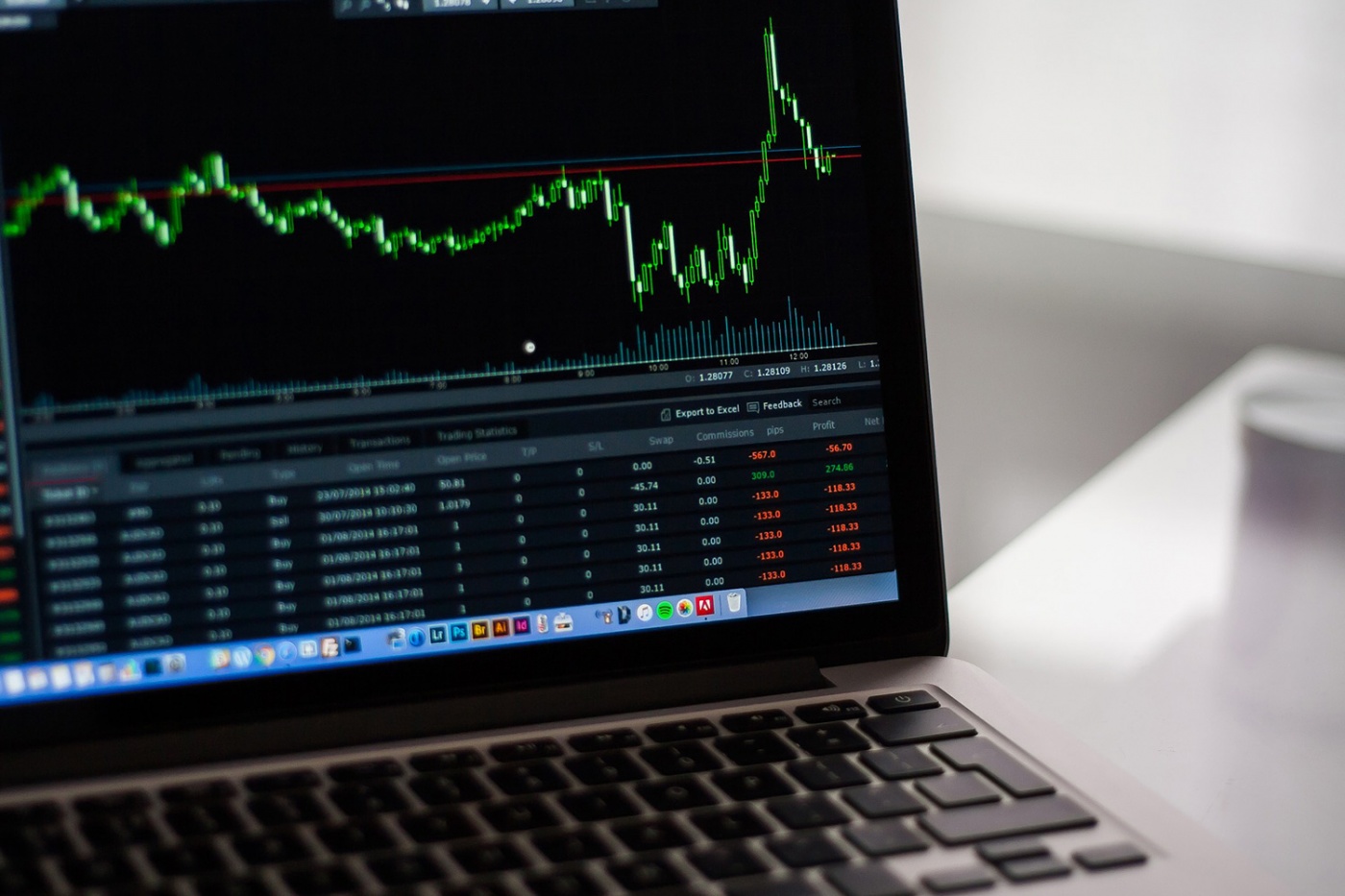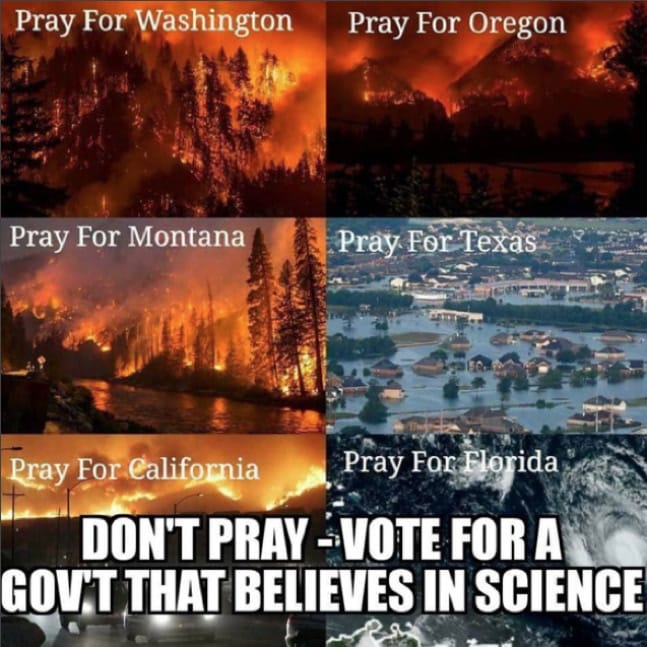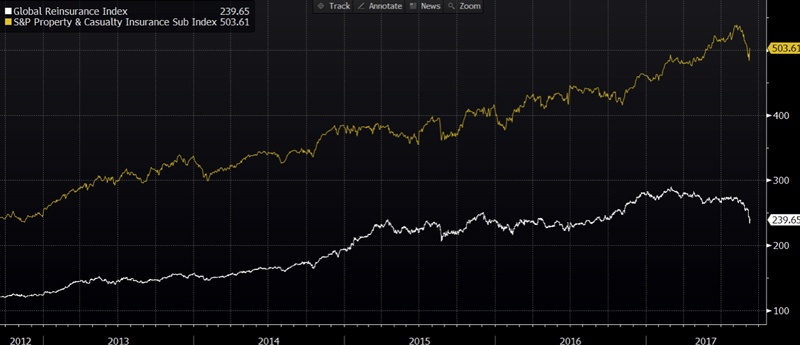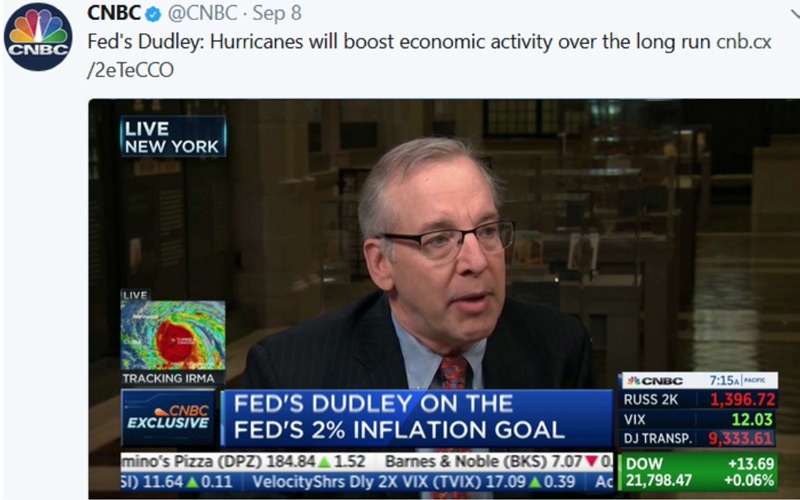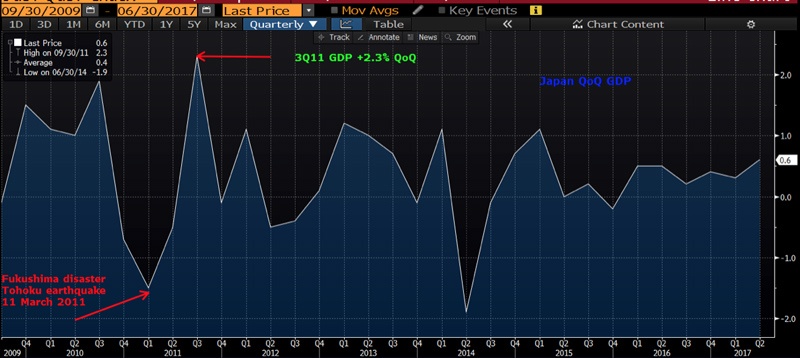Bond Markets: The Bills and The Bonds That Will Pay for Them
It just goes to show we cannot predict hurricanes or earthquakes or Kim Jong-un or markets.
Insanity rules the week and inundates the markets, running from nuclear tests to a series of hurricanes, to earthquakes, to central banks, to 270,000 displaced Rohingyas and, to the millions of young American dreamers who risk losing the lives they have built, to be deported to goodness knows where if Donald Trump has his way.
3 weeks ago, when we wrote about the first total solar eclipse to cross America in nearly a century, we highlighted a Fortune magazine citing depression as the most widespread disease in the world today. Without much doubt, we can safely assume global depression rates have shot up exponentially since.
Is it God’s wrath, as some people are saying? That Houston and Florida, see two once- in-500-year storms and flooding while L.A. declared a state of emergency this week for wildfires that are also ravaging 438,000 acres of Montana, with a total of 78 large wildfires in 8 western states?
God’s wrath, surely not, on the Carribean playgrounds of Americans too? Anguilla and Barbuda losing 90% of their building structures are probably the worst hit, but Barbados, B.V.I., Cuba, Puerto Rico, St Martin & St Barts, Turks & Caicos and the US Virgin Islands will see their bread and butter tourism industry wiped out, taking years to rebuild and for the fishes to return.

Source: Wikipedia
It is just as well that we had the biggest solar flare in 12 years that struck earth this week, bringing beautiful northern lights to the UK, but also bringing down satellites and communication networks—and that is possibly why North Korea shrewdly decided not to fire any missiles over this weekend.
Yet for the same reason, there is trace evidence that the strongest earthquake in a century for Mexico could have been caused by the severe geomagnetic storms in the atmosphere resulting from those solar flares.
Meanwhile, South Asian countries like Bangladesh has their worst floods in 4 decades, which is bad news for the 270,000 Rohingya refugees fleeing genocide in Myanmar to Bangladesh in the past 2 weeks. 270,000 in 2 weeks is just about a quarter of the total Rohingya population, described as the most persecuted minority in the world by the UN in 2013, with the Palestinians fighting for top spot on the persecution table .
We think all this happening in the name of religion when September 11 strikes after midnight?
It just goes to show we cannot predict anything, just like the folks in the American Hurricane Centre and other experts were unable to predict the path of Hurricane Irma or Harvey with certainty, and Miami, despite forecasts, dodged the worst Irma who has decided to head west as we write.
Frustrated folks in Florida have arranged to shoot down the hurricane, protest the hurricane away and even blow the hurricane down with their fans. Intentions and behaviours that serious enough to warrant warnings on Twitter of “not to shoot the hurricane” by the sheriff department.
The sense of helplessness is something we can empathise with, as folks await the hurricane while we await the next missile launch, them losing faith in the hurricane and earthquake experts as we lose faith in the central banks. At this rate, no one will even blink if Yellowstone erupts next or if an asteroid does hit Earth on the 23rd of September as doomsdayers are saying.
We would qualify that Yellowstone is indeed experiencing one of the biggest and longest earthquake swarms ever recorded, citing Newsweek.

Source: Newsweek
We cannot control the path of the hurricane or the markets. And before we pick up the next economic forecast, we give thought to the latest debate going on out there that economists are the new astrologers, reviving gripes from many in the past.
For Our Parts—Taking Out The Wallets
We look at the big picture, of the economic impact of all that is happening around the world, and read about the small pictures, of those people whose lives have been affected.
What is it like to lose everything for the victims of disaster—natural and man-made? Not to lose one’s existence but the life one has built? To be caught pants down, without a roof over one’s head, water or power, an uncertain fate, and worst still, dependent on the charity of others?
And we take out those wallets, as a friend did at the urging of her son who wanted her to contribute to J.J. Watts’ (plays defensive end for Houston Texans) crowdfunding relief efforts for victims of Hurricane Harvey.
Then we wonder about all those livelihoods lost in the Caribbean and hope they can find work in re-construction, for the Rohingyas, Dreamers, and Ethiopians suffering another massive famine. Out comes the wallet again.
Paying The Bills
It is all we can do in our small capacities to help but there will be bills to pay soon.
The Economist cited that there are 4 times as many extreme weather events now than back in 1970. Reinsurance and property insurance stocks which took a hit on Harvey, took a bigger hit when Irma looked destined for the Florida, the 4th largest state by population in the U.S.
Orange juice prices managed to make a comeback to give the central bank some inflationary hopes, given that Florida produces 60% of U.S. oranges (and also tomatoes, grapefruits, watermelon and sugar cane), just as shortages of construction materials and a shortage of construction workers will drive prices higher.
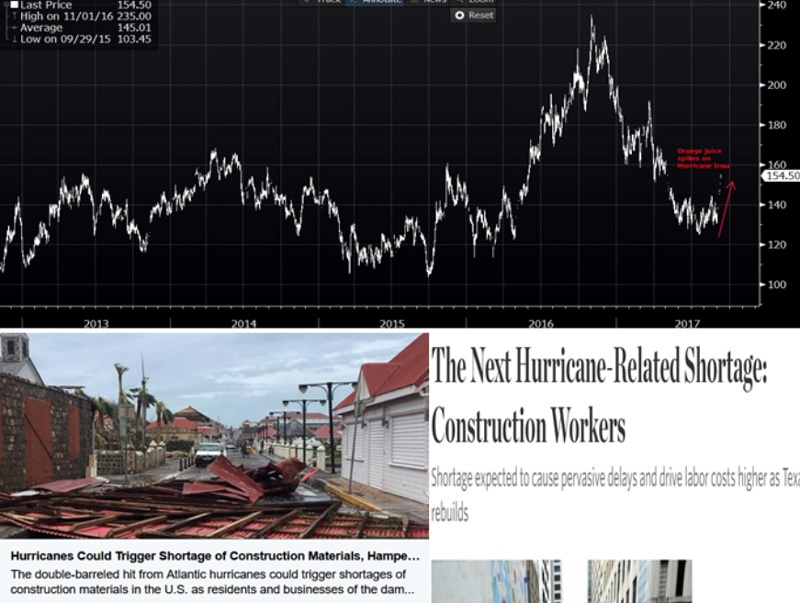
Graph of Orange Juice Futures Prices and WSJ headlines
Bloomberg article, Who Pays Cost of Mother Nature’s Destructive Fury, gave the example of 2011’s record nature disaster bill (Fukushima) of US$ 380 bio which had only less than 1/3 covered by insurance.
It looks like the brunt of the damages and help will be left to the devices of the victims, governments and aid agencies. For surely, we cannot expect those Caribbean houses to be insured even if the hotels and pleasure boats are.
In other words, ultimately, there will be bills that will cost money, to the reinsurers, government, aid agencies and the little guy who has to repair his home and buy a new car. And it is not something anyone can walk away from because the road has to be rebuilt, the airport repaired, the shops restored and we get the gist.
That money will mostly come from borrowings while the rest will come from savings.
Yes. Let’s assume that insurance and reinsurance companies have the savings (from their pool of assets) to pay 1/3 the bill. The government does not have savings which means the government will have to borrow to pay for the repair bills till they get the money from taxes.
Savings will have to be liquidated which means assets will have to be sold and those assets are usually bonds. Government borrowings are treasury bills and bonds too because governments do not typically issue equity unless they sell national assets. We learnt last week that FEMA (Federal Emergency Management Agency) is still choking on the 2005 Hurricane Katrina debt of US$ 25 bio, Irma and Harvey will be much bigger burdens to bear.
And with Hurricane Harvey’s highest initial estimate at US$ 190 bio and Hurricane Irma looking at an initial US$ 250 bio storm, that is a bill of US$ 440 bio from just 2 natural disasters which will break the record set in 2011 of US$ 380 bio.
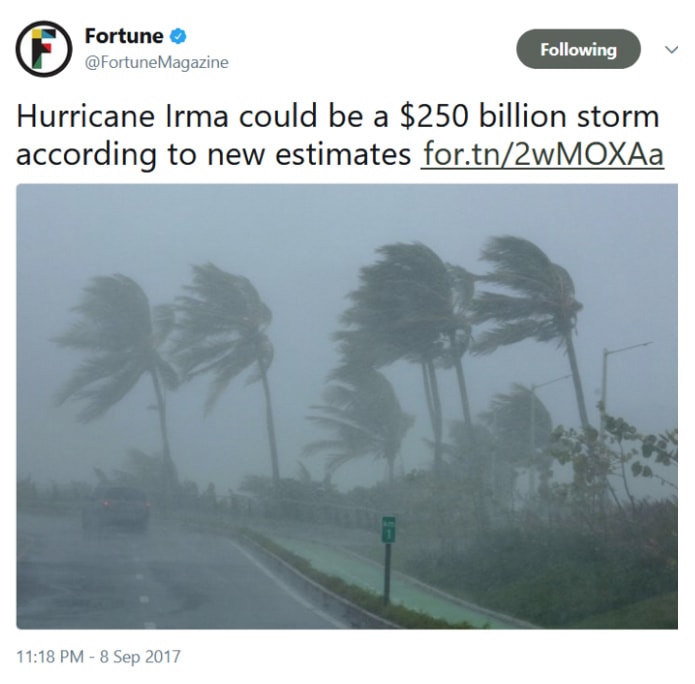
Source: Fortune Magazine
Going down the food chain, aid agencies will similarly have to source for funds from donors or governments which means more savings liquidated and borrowings incurred.
Corporations will have to draw on their insurance claims or savings or borrowings as individuals will have to do the same.
There will be bills to be paid, evidenced by the CAT bonds (that we mentioned last week) market this week when investors bailed in a hurry causing the Swiss Re CAT Bond Index price to fall 16% on the week as the S&P rating agency warned that $1.4 bio of CAT bonds would be at risk due to Hurricane Irma and Barclays estimated insured damages to reach US$ 130 bio.
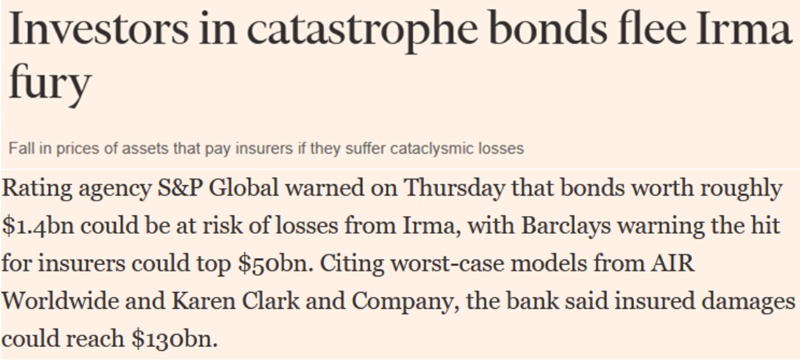
Source: FT
Bond Issuer vs Bond Investor
The timing cannot be more perfect just when interest rates in the world are starting to look iffy and headed higher as central banks prepare to unwind their balance sheets even after purchasing nearly US$ 2 trillion of assets this year, the most since Lehman in 2009 because between 2009 and 2017, only US$ 11.26 trillion have been added so 2017 has been above average. Now, all that is expected to be on hold.
It is a good time for corporates and the US government to borrow especially when markets are expecting the US Fed to delay on rate hikes (although that did not happen with single Hurricane Katrina in 2005) on the double hurricanes.
Credit spreads are at their tightest since the crisis easily illustrated by Euro denominated junk bonds yielding the same as US treasuries, making it a borrower’s market.
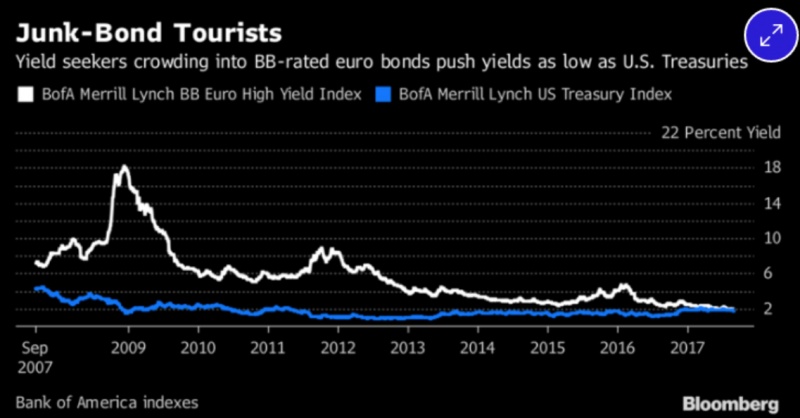
Source: Bloomberg
The US debt ceiling debate has been postponed to December and more likely than not, will be extended for the country to tide through the catastrophes.
Thanks to North Korea, government bond yields will remain capped as investors seek safe havens.
Yet, at the same time, these are dangerous times for investors i.e. buyers of bonds.
This is the longest expansionary period in postwar history. As Bloomberg wrote in their article, In World of Supposed Bubbles Here’s What Investors Fear Most, “From Alan Greenspan and the current Federal Reserve staff to fund managers hoarding cash, people feel queasy about asset prices”. And, what is the biggest fear? Bond markets (… and Bitcoin).
It is not just Greenspan and the regulator gang, even Deutsche Bank CEO, John Cryan, came out this week to voice his concern about bubbles in “riskier credit markets” (i.e. fixed income/bonds).
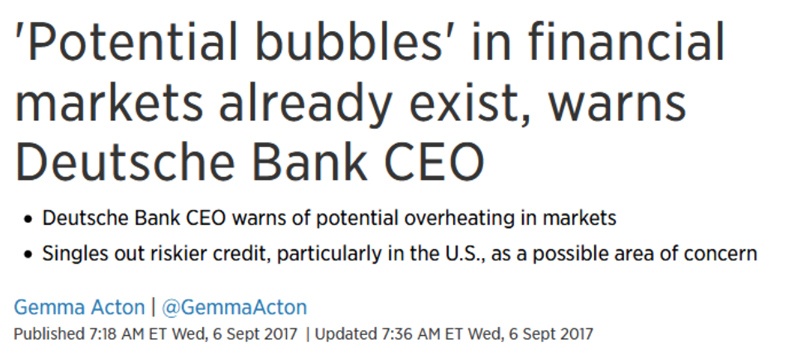
Source: CNBC
On the same day, Goldman Sachs CEO, Lloyd Blankfein, also sounded a warning that markets are too frothy.

Source: WSJ
Bubbles? Why not? Central banks have added US$ 2 trillion to the markets this year, more than they have done on average in the past 7 years.
It is a big risk of an assumption that central banks will keep monetary policy easy because Hurricane Katrina did not pause the Fed from hiking back in 2005. In fact, Fed’s Dudley just signaled, prior to Fed blackout till the FOMC next week, he would support a December rate hike even if the markets have priced that possibility to near zero.
In his interview on CNBC, Dudley also stated he expects hurricanes to boost economic activity in the long run.
Source: CNBC
He is not wrong because this has happened to Japanese quarterly GDP after Fukushima. Yes, it spiked!
The Bills and The Bonds that Will Pay For Them
We cannot predict what will happen for we are not astrologers/economists, but for certainly can use our heads to conclude that there will be a lot of borrowing to do in the weeks and months ahead.
The monies borrowed will be re-borrowed until folks, governments, and corporations make enough money to pay it back.
Using our heads, we know that the huge supply of borrowings will only drive up borrowing costs even though there will be short-term drag on the GDP because flooded farms and burnt factories produce no output.
We will not talk about the wall of bond maturities looming for China as we congratulate ourselves on our safe Singapore markets with the 10Y government yields at 1.93% even if they were 2.15% last month, possibly due to Singapore’s hurricane-free shores and only a dozen defaults to worry about. Yet, we cannot be sure if Singapore will be spared if borrowing costs are going up elsewhere.
For our heads, we cannot imagine who will be buying bonds today. Not us.
Once we shake out the fear of Kim Jong Un and his nuclear missile collection and finish with losing sleep over his war games, we find there are millions of people out there feeling like their lives have ended. As we continue to feel smug, congratulating ourselves on our leaders’ no-refugee policy and blessed location in the equator, we might even consider reaching for our wallets, as global citizens, sell some bonds and do some giving instead.
